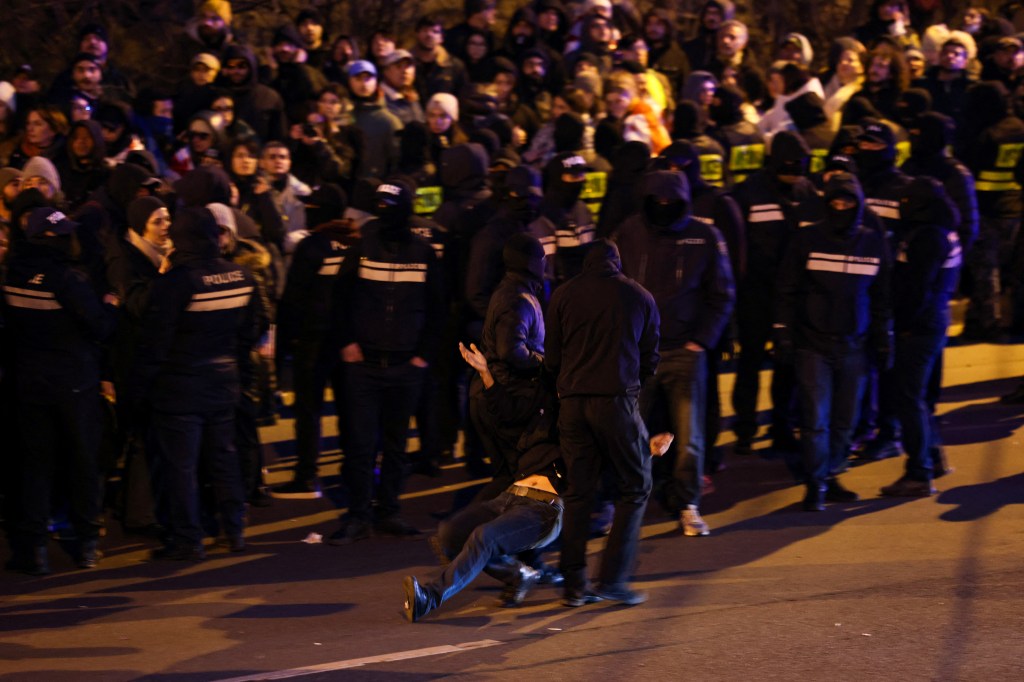New York, February 7, 2025 – In Georgia, resurgent protests demanding new elections have been met with a violent police crackdown in which authorities forcefully obstructed or assaulted more than a dozen journalists covering the demonstrations.
Protests against the Georgian Dream party’s disputed October election victory and the November suspension of European Union accession talks had diminished in scale in the capital, Tbilisi, for several weeks, but took on new force in early February. Most of the recent attacks on journalists happened at a February 2 protest in Tbilisi, while others were obstructed or attacked at a smaller demonstration calling for the release of jailed journalist Mzia Amaghlobeli on February 4.
Mamuka Andguladze, chair of local rights group Media Advocacy Coalition, told CPJ that authorities have yet to prosecute a single police perpetrator of violence against journalists, pointing to Georgian riot police’s failure to wear individual identifying badges, frequent use of masks, and a “political decision” by the authorities not to prosecute culprits.
“Continued police brutality against journalists in Georgia is sadly predictable given authorities’ failure to hold officers responsible for dozens of similar cases over recent months,” said Gulnoza Said, CPJ’s Europe and Central Asia program coordinator. “Georgian authorities must urgently break the cycle of impunity by effectively investigating police attacks on the press and ensuring officers wear badges making them individually identifiable.”
During the February 2 protest in northern Tbilisi, Dea Mamiseishvili, a reporter for independent broadcaster Mtavari Arkhi, was filming police hit protesters with her cell phone when a group of officers repeatedly struck her on the arms, kicked her in the legs, and pushed her, trying to take her phone, according to the journalist and footage of the incident. Mamiseishvili told CPJ that police officers also repeatedly pushed her camera operator, Luka Bachilava, and struck him in the head earlier that evening to stop him filming the arrest of an opposition politician.
On February 4, outside the parliament building, officers threw Vantsent Khabeishvili, chief editor of the independent outlet On.ge, to the curb and grabbed Publika reporter Natia Leverashvili by her hair, according to video footage and a statement by independent trade group Georgian Charter of Journalistic Ethics.
CPJ has also documented the following incidents of police obstruction on February 2 and one on February 4:
- On February 2, officers grabbed and pushed Diana Chirgadze, a reporter for independent broadcaster TV Pirveli, kicked camera operator George Pataraia and struck his camera, Chirgadze told CPJ.
- Police forcefully pushed Aprili’s photographer Vakho Kareli and reporter Nata Uridia away from the scene after they filmed officers beating and arresting protesters, Uridia told CPJ.
- Officers blocked and grabbed Radio Marneuli camera operator Vladimer Chkhitunidze while he was filming the arrest of an opposition politician and pushed him away from the scene, the journalist told CPJ.
- Mirza Kezevadze, deputy director of the police department that oversees riot police, grabbed the phone of TV Pirveli reporter Khatia Samkharadze after she filmed a car carrying the police department’s director Zviad Kharazishvili away from the protest site. Kezevadze dropped and kicked the phone, damaging it, Samkharadze told CPJ. (Both Kezevadze and Kharazishvili are facing international sanctions for ordering violent responses to protests.)
- Police officers blocked Ninia Kakabadze, a journalist for media criticism platform Mediachecker, and repeatedly struck her hand to prevent her from filming the same vehicle with her phone, Kakabadze told CPJ.
- Officers tried to grab the microphone of Giorgi Kvizhinadze, a reporter for independent broadcaster Formula TV and struck the outlet’s camera, according to a video, reviewed by CPJ.
- A plainclothes individual struck the camera of Guria News reporter Akaki Sikharulidze while he was filming police beat protesters, the journalist told CPJ.
- On February 4, OC Media reporter Givi Avaliani was filming police arrest protesters with his cell phone when an officer tried to grab his phone.
The violent crackdown on mass protests in Georgia and the brutalization of journalists has led countries including the U.S. and U.K. to sanction Georgia’s minister of internal affairs and police officials in charge of its riot police. In December and February, the government passed laws extending police powers to crack down on protest and dramatically increasing penalties for protest-related offenses.
CPJ emailed Georgian police and the Special Investigation Service for comment but did not immediately receive replies.
Editor’s note: The status of a law increasing penalties for protest-related offenses has been updated in the second to last paragraph.
